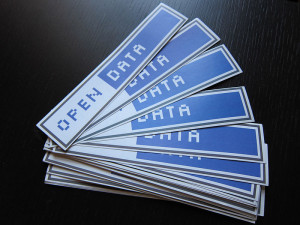Introduction
The paradigms of Open Access, Open Source software, Creative Commons, etc., are all very well known. In particular, readers of the blog SciELO em Perspectiva (SciELO in Perspective) are very familiar with those concepts and the advantages of the free access to information for the academic community and the public at large as a way of democratizing knowledge and creating well- informed citizens.
The Free Open Source Software movement (FOSS), started by Richard Stallman, has been in existence now for 30 years. Open Access and Creative Commons have been around more than 10 years, and the SciELO Program has just celebrated its first 15 years. Now, over the last few years, a new phenomenon known as Open data (OD) or “liquid information”, to paraphrase Zygmunt Bauman, has begun to gain momentum. “Liquid information” refers to those data which are recorded on digital media, are continually being updated, with no access restrictions, widely available and in formats which can be shared via open protocols.
At the end of October 2013, the McKinsey Global Institute (MGI) published a research report which analyzes the potential for machine-readable information, and particularly government data, which could generate significant economic value, through innovations and services, if this information were freely available.
The report titled Open data: Unlocking innovation and performance with liquid information analyses seven sectors of economic and social activity: Education; Transportation; Consumer Products; Electricity; Oil and Gas; Health Care and Consumer Finance. The report concludes that if Open data were available, in the USA alone, the GDP could be increased by $3 to $5 trillion a year. The report also indicates that Open data are already changing the ways in which teachers and professors teach, the way in which students learn, how administrators take decisions, and how graduates are able to find the employers which match their profiles and aspirations.
Open data can become an instrument for breaking down information gaps across all economic, goods and services, and academic sectors so that benchmarks can be shared to spread best practices which raise productivity. Naturally, this will not happen automatically, and it will be necessary to invest in technology, generate professionalism and experience and much work by governments, to craft policies which are in harmony with progress which facilitates the flow of data, while at the same time protecting privacy and intellectual property. The main conclusion of the McKinsey report is that the Open data movement can become a virtuous cycle only if public agencies, academia and private industry are capable of cultivating a vibrant Open data ecosystem.
Open or Liquid Data
According the McKinsey Report, the data repositories must have at least the following attributes so that Open data can be used to increase productivity:
- Accessibility: everyone should have access, or at the very least, the broadest spectrum of users should have the right to use them.
- Machine-readable: Open data must be available in formats which can be easily retrieved in many different ways and can be processed by computers.
- Cost: Free or at minimal cost.
- Rights: The rights to use and distribute these data should be without limitation.
This worldwide movement for Open data has prompted a global organization, the World Wide Web Foundation, to create a new section called Open Data Barometer, which measures the performance of governments on the basis of 14 metrics for unlocking data. The Open Data Barometer: 2013 Global Report, published only a few days ago, ranks 77 countries selected from all the world’s continents. The United Kingdom, the United States, Sweden, New Zealand, Norway, Denmark, Australia and Canada make up the top eight according to Open data criteria. Latin America appears newly represented in the report, with countries ranked between positions 25 to 62. Brazil which currently has a statutory provision in article 5 of the Federal Constitution which is reflected in the Proyecto de Ley nº 41/20106, is nevertheless in 28th place, third in Latin America behind Mexico and Chile.
Various national governments have created hundreds of Web Sites which allow access to information which they compile across their different national or municipal agencies, in an international plan of a Culture of Open data and Open Government. At the time of writing this article (03/11/2013), the Datacatalogs.org project has registered 385 data catalogs from more than 40 countries that are offering more than a million data-sets which have been opened up by world governments.
The reason behind the international project of the Culture of Open data is to make governments more efficient and effective, by identifying ways to improve public services which fulfill the needs of their citizens by means of digital technologies; supply primary material (data) for the information economy; transparency in allowing citizens to monitor what governments do with the taxes they raise; inclusion and empowerment which balances the skewed nature of the availability of information between those that hold political power and their citizens.
Open data and Academia
From the general viewpoint of society Open data play an important role, but what is its specific importance in the academic world, which is where SciELO is the most involved? Open data include, in addition to what has been mentioned before, geographic information, data on the human genome, medical data, biodiversity, meteorological series, and economic series. All these data sets are sources of data that historically have been restricted to being in Open Access by permissions, licenses, patents, etc.
As an example of its application, let us take one of the seven sectors that the report of the McKinsey Global Institute analyzes, the area of Health Care. The amount of data compiled, analyzed and shared with the different players in the field of health has reached a critical mass which exceeds by orders of magnitude the controlled trials which are published as research works in journals. The volumes of medical records in digital form, the research and data that have been collected by governments for years, would allow for a critical view between the different therapies given to patients, an analysis of the cost/ benefit of hospital systems, and identification of unnecessary costs. Of course, problems in the lack of standardization of data need to be resolved, including with pharmaceutical companies whose data, by and large, remain isolated. The same applies to privacy and confidentiality in medical procedures.
Arguments for and against Open data
As in all aspects of life, when one tries to modify the status quo, there are voices for and against. Whatever the situation, good or bad, surely someone wins and someone loses, and in trying to modify it, presumably for the better, those who at the time are the winners are going to oppose it. The topic of Open data does not escape this behavior of society.
Those who are against making data openly available base their position on arguments which seek to guarantee their market position, and also base them on economic philosophies, all of which, of course, is legitimate. For example, it is argued that governments should not put the activities of the private sector at risk, that to use public funds to compile data that is also compiled by the commercial sector is not an efficient use of taxes, that it could affect the privacy of citizens, that the compilation, administration and dissemination of data are labor-intensive activities that have costs that should be recovered, that there are non-profit organizations that can be funded through these activities, and finally, the classic argument of the “free rider”, in other words, if someone offers services for free it will remove incentives to invest in that area and thus put a brake on innovation.
On the contrary, those who are in favor of Open data put forward, as arguments, that fundamental data belong to humanity, typically data such as genome data, medical science, environmental data, and all those which are protected by various international conventions, such as the OECD Principles and Guidelines for Access to Research Data from Public Funding published in 2007; that if the funding for the compilation of data comes from public funds, then the result of these works should be made universally available; that the original data should not be legally protected by copyright; that the data are necessary to improve the socio-economic development of the citizens; and that having access to data without restriction, particularly when it comes to scientific research, can accelerate the rate of discoveries.
Open data and the other “Open” movements
The objectives of the Open data movement are similar to other open initiatives such as the making of academic publications freely available on the Internet (either by the Gold Road, Green, or others), such as is being promoted by the SciELO Program. Open data have the intention of making resources that are aimed at the public available at no cost in all their forms. Likewise, Open Knowledge, according to the Open Knowledge Foundation, embraces the unlocking of a range of topics that includes Open data but which is not limited to these, but rather, in its most general sense, incorporates the principles and protocols of CC Science Commons, including, in addition to the published science, failed experiments, original experimental data, Open Source programs, and the interconnection of data sets and techniques for linking data to allow for trans-disciplinary and reproducible research.
In addition to government policies of unlocking their own data, it is important to promote, at the level of the funding agencies, the creation of repositories of bioinformatic, molecular, and experimental data which will guarantee their preservation, for at least five years after funding ends, regardless of whether or not these data are published.
Conclusion
Open Access, Open Source, Creative Commons and now Open data – the world is in an accelerated process of change and, as Bob Dylan said: Times They are a-Changin’.
| The line it is drawn The curse it is cast The slow one now Will later be fast As the present now Will later be past The order is Rapidly fadin’ And the first one now Will later be last For the times they are a-changin’ |
External links
McKinsey Global Institute – http://www.mckinsey.com/
Open data: Unlocking innovation and performance with liquid information – http://www.mckinsey.com/insights/business_technology/open_data_unlocking_innovation_and_performance_with_liquid_information
World Wide Web Foundation – http://www.webfoundation.org/
Open Data Barometer: 2013 Global Report – http://www.webfoundation.org/2013/10/open-data-barometer-launched-by-web-foundation-open-data-institute/
Datacatalogs.org – http://datacatalogs.org/
OECD Principles and Guidelines for Access to Research Data from Public Funding – http://www.oecd.org/science/sci-tech/oecdprinciplesandguidelinesforaccesstoresearchdatafrompublicfunding.htm
Open Knowledge Foundation – http://okfn.org/
CC Science Commons – http://sciencecommons.org/projects/publishing/open-access-data-protocol/
Proyecto de Ley nº 41/20106 –http://www.senado.gov.br/atividade/materia/detalhes.asp?p_cod_mate=96674
 About Ernesto Spinak
About Ernesto Spinak
Collaborator on the SciELO program, a Systems Engineer with a Bachelor’s degree in Library Science, and a Diploma of Advanced Studies from the Universitat Oberta de Catalunya (Barcelona, Spain) and a Master’s in “Sociedad de la Información” (Information Society) from the same university. Currently has a consulting company that provides services in information projects to 14 government institutions and universities in Uruguay.
Translated from the original in Spanish by Nicholas Cop Consulting.
Como citar este post [ISO 690/2010]:













Recent Comments